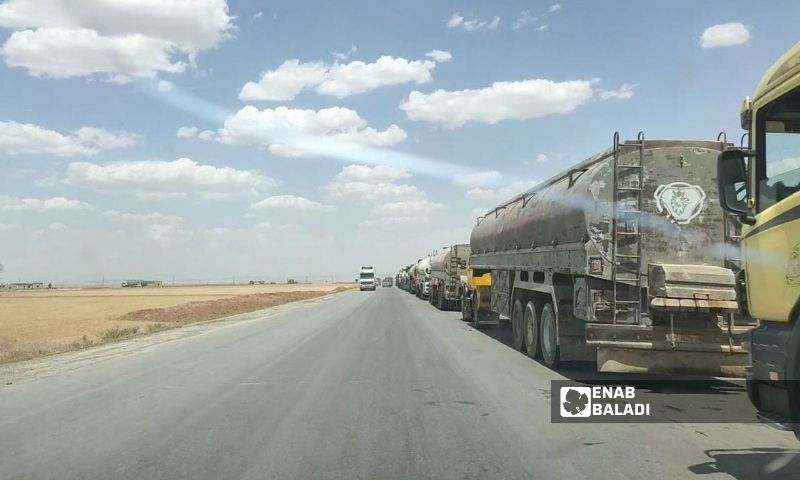



During the past two months, there have been numerous decisions to raise fuel prices by the Ministry of Trade and Consumer Protection in the Syrian regime’s government, which is in the interest of the Golden Gate company, which is jointly authorized with the state-run Mahrukat company to sell petroleum derivatives to industrial facilities.
The most recent of these decisions was issued on Sunday, September 17, to raise the prices of unsubsidized diesel, fuel, and “liquid DOC” gas distributed to the industrial sector and other sectors.
The Ministry of Commerce set the price of a liter of unsubsidized diesel at 13,000 Syrian pounds instead of 12,360 Syrian pounds. It also set the price of a liter of “95 octane” gasoline to 14,660 SYP instead of 14,460 SYP per liter.
The price of fuel rose to 8.86 million Syrian pounds per ton, instead of 8.25 million Syrian pounds for the previous price, and “liquid gas” to 10.45 million Syrian pounds instead of 9.97 million Syrian pounds per ton.
The trading rate of the Syrian pound against $1 reached 13,700 on September 20, according to the S-P Today currency website.
This increase comes after the decision issued by the Ministry on September 4 to withdraw from raising the price of fuel after raising it twice last August.
On August 28, the Ministry of Internal Trade raised the prices of all petroleum derivatives. According to the decision, the price of a liter of “95 octane” gasoline became 14,700 pounds instead of 13,500, and a liter of unsubsidized diesel fuel became 12,800 pounds instead of 11,550.
On August 15, the Ministry also raised all oil derivatives by up to 300%, coinciding with a presidential decree to increase salaries and wages for workers in the state by 100%.
On July 6, the Central Bank of Syria (CBS) issued Resolution No. “904/LE,” which includes “the characteristics of bank cards issued by banks operating for industrial establishments and the mechanism for settling transactions executed using these cards on point-of-sale devices distributed in the chambers of industry and commerce and gas stations belonging to the Mahrukat and Golden Gate companies to be used to pay the price of petroleum derivatives sold to industrial facilities.”
The decision confirmed that the daily purchase ceiling for industrial facilities of fuel from the Mahrukat and private Golden Gate is unlimited, but it set the ceiling for one transaction at three billion Syrian pounds.
Based on this decision, the Golden Gate Company announced on its Facebook page that owners of economic activities can obtain all allocations of diesel, fuel, and gas through specialized chambers (industry, commerce, and tourism) or by sending orders via company email.
According to the decision, the Golden Gate Company has become the only private company that has the right to sell fuel to industrialists and economic operators at profits that are considered good, especially with the decisions to raise prices.
On August 18, the Minister of Oil, Firas Kaddour, said that the cost of producing a liter of diesel is 12,000 pounds, and the cost of a liter of gasoline is 12,100 pounds.
Since September 2018, the Ministry of Internal Trade has ratified the decision of the General Authority of the Golden Gate Transport, Shipping, and Tourism Limited Liability Company, which includes amending the company’s internal regulations.
The decision published in the Official Gazette stipulated the election of Ahmed Bashir Mohammed Baraa Qaterji as General Manager of the company and Mohammad Agha Ahmed Rushdi Qaterji as Deputy Director General.
The Ministry of Internal Trade approved amending the company’s purpose, allowing it to establish and invest in gas stations and sell oil derivatives. It also changed its full name to become the Golden Gate Transport and Oil Services Limited Liability Company, according to the decision published in the Official Gazette.
The Qaterji family is considered one of the new war-rich people close to the Syrian regime, which allowed the expansion of the family’s influence and the strengthening of its presence in the country’s economy.
The Ministry of Internal Trade had previously issued a decision in December 2022, allowing the family-owned B.S. company to sell diesel and gasoline for economic activities.
The Qaterji family obtained a license to open the “Afaq” cement company in Aleppo, according to what was published in the Official Gazette in December 2022, and the Qaterji Trade and Transport company acquired a government project to transport passengers, tourist groups, goods, containers, and livestock.
Director of the Syrian Program at the Observatory of Political and Economic Networks, Karam Shaar, said on Facebook that he believes that the government’s public sector established its decisions to enable the Golden Gate Company to achieve financial profits.
This approach is not intended to enrich the Qaterji family but rather as a kind of investment for the benefit of the head of the Syrian regime, Bashar al-Assad, according to Shaar, who holds a Ph.D. in economics and who cited other similar cases from businessmen close to the authority, such as Ali Najib Ibrahim, Yasar Ibrahim, and Ramia Hamdan Deeb, and others as commercial fronts for Assad’s interests.
According to a study by the Harmoon Center, released in 2022, the Syrian regime is relying on shell companies and front personalities who appeared “suddenly” in the world of business, had no history of economic or financial work, and occupied positions and economic activities that were historically considered areas of activity for the Assad family.
if you think the article contain wrong information or you have additional details Send Correction